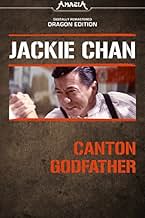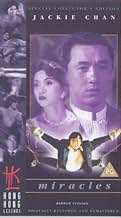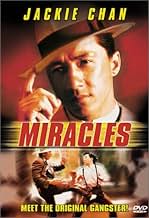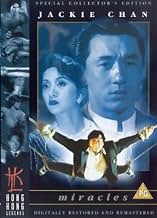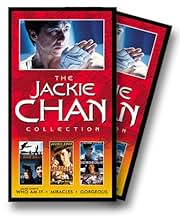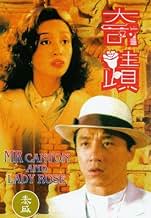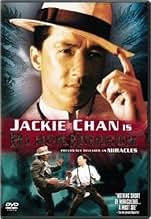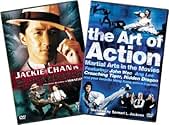IMDb RATING
6.9/10
5.9K
YOUR RATING
A country boy becomes the head of a gang through the purchase of some lucky roses from an old lady. He and a singer at the gang's nightclub try to do a good deed for the old lady when her da... Read allA country boy becomes the head of a gang through the purchase of some lucky roses from an old lady. He and a singer at the gang's nightclub try to do a good deed for the old lady when her daughter comes to visit.A country boy becomes the head of a gang through the purchase of some lucky roses from an old lady. He and a singer at the gang's nightclub try to do a good deed for the old lady when her daughter comes to visit.
- Awards
- 1 win & 8 nominations total
Ah-Lei Gua
- Madam Kao
- (as Yah-Leh Gui)
Ko Chun-Hsiung
- Tiger
- (as Chun Hsiung Ko)
Dik-Hak Chan
- Chen Wah's Man
- (as Ti-Ko Chen)
Wai-Yu Chan
- Lady Rose's Friend
- (as Wai-Yue Chan)
Featured reviews
'Miracles' (I actually like the Australian version title 'The Canton Godfather' more) is quite different from usual Jackie Chan's action choreography movies. It is more situation comedy in 1930s Hollywood fashion, but in Jackie Chan's sauce. The magnificent action and fight scenes are still in, but this time the film concentrates more on simple storytelling and comedy with lavishing set pieces depicting 1930's Hong Kong. The film is over two hours long, but it doesnt' drag as the pacing between action scenes is nearly perfect. Jackie Chan's comedic timing and use of slapstick is as masterful as his martial arts skills. Might not be Chan's best movie, but it is still very enjoyable. Sweet but not sticky. And every once in a while it is nice to see one of your favorite heroes doing something little different.
Plus - Jackie Chan himself considers 'Miracles' his best directorial effort.
Plus - Jackie Chan himself considers 'Miracles' his best directorial effort.
This 1989 Jackie Chan movie differs from most of his usual movie in terms of being less action-filled and having less slapstick comedy in it. This is one of the more 'serious' of movies in his career, although he did manage to put in some comedy elements here and there.
Jackie Chan directed "Miracles" (aka "Qi ji") himself and also starred in it alongside with Anita Mui. The two do have good on-screen chemistry together and do compliment one another well throughout the course of the movie. However, Bill Tung (playing Tung) and Richard Ng (playing Captain Ho) were also really good throughout the movie and added a lot of charm and humor to the movie. I didn't even realize that Biao Yuen had a cameo in the movie until after I checked the full cast list on IMDb, nor did I see Simon Yam as a police man either.
There is, of course, martial arts, stunts and action throughout this movie, as it is a Jackie Chan movie after all. But it is not as prominent a key element to the movie as seen in most of his prior and later work. And with this being a Jackie Chan movie, the action, martial arts and stunts you get is of course excellent and so well choreographed and equally well executed.
The story in "Miracles" is about a newcomer to Hong Kong in the 1930's who is hustled out of his last remaining money. He reluctantly becomes a mafia boss and finds himself trying to do good in a world run by criminals and hoodlums.
I will say that the story was good, although the movie felt a bit too long running at two hours and nineteen minutes. It could have used some trimming down here and there. But all in all, it was enjoyable and a good wholehearted Jackie Chan movie.
The cast in "Miracles" was quite good, with a handful of some very familiar faces (as listed earlier above), especially if you are familiar with the Hong Kong cinema. The cast ensemble did perform well in their given roles and characters.
I think that with this 1989 movie then Jackie Chan also established himself as being capable of branching out to other genres than his all too familiar martial arts action comedies. And that was a good achievement.
All in all, "Miracles" is an enjoyable movie to watch for fans of Jackie Chan and newcomers alike. And for us who are a fan of the traditional Jackie Chan movies then "Miracles" was a much welcomed breath of fresh air and a foray into new territory for the beloved action star.
Jackie Chan directed "Miracles" (aka "Qi ji") himself and also starred in it alongside with Anita Mui. The two do have good on-screen chemistry together and do compliment one another well throughout the course of the movie. However, Bill Tung (playing Tung) and Richard Ng (playing Captain Ho) were also really good throughout the movie and added a lot of charm and humor to the movie. I didn't even realize that Biao Yuen had a cameo in the movie until after I checked the full cast list on IMDb, nor did I see Simon Yam as a police man either.
There is, of course, martial arts, stunts and action throughout this movie, as it is a Jackie Chan movie after all. But it is not as prominent a key element to the movie as seen in most of his prior and later work. And with this being a Jackie Chan movie, the action, martial arts and stunts you get is of course excellent and so well choreographed and equally well executed.
The story in "Miracles" is about a newcomer to Hong Kong in the 1930's who is hustled out of his last remaining money. He reluctantly becomes a mafia boss and finds himself trying to do good in a world run by criminals and hoodlums.
I will say that the story was good, although the movie felt a bit too long running at two hours and nineteen minutes. It could have used some trimming down here and there. But all in all, it was enjoyable and a good wholehearted Jackie Chan movie.
The cast in "Miracles" was quite good, with a handful of some very familiar faces (as listed earlier above), especially if you are familiar with the Hong Kong cinema. The cast ensemble did perform well in their given roles and characters.
I think that with this 1989 movie then Jackie Chan also established himself as being capable of branching out to other genres than his all too familiar martial arts action comedies. And that was a good achievement.
All in all, "Miracles" is an enjoyable movie to watch for fans of Jackie Chan and newcomers alike. And for us who are a fan of the traditional Jackie Chan movies then "Miracles" was a much welcomed breath of fresh air and a foray into new territory for the beloved action star.
It is the 1930's, and naïve country boy Kuo Cheng-Wah has just arrived in Hong Kong. A violent gang war has broken out over the city, which he finds himself in the middle of. After a gang boss bequeaths him his empire, Cheng-Wah opens a nightclub, featuring the sultry singer Yang Luming as star attraction. Meanwhile, Madame Kao, an impoverished street seller, needs Cheng-Wah's help if she is to convince her daughter she is a lady of means. So begins a madcap tale full of action, comedy and romance sure to leave audiences spellbound.
Directed by Jackie Chan and based on Damon Runyon's short story 'Madame La Gimp,' 'Miracles' is a heartwarming, exciting comedy both fun and fast-paced. Runyon's source material had been adapted for the screen twice before by Frank Capra, in 1933 with 'Lady For A Day' and 1961 with 'Pocketful of Miracles,' but Chan's version is by far the most memorable. Combining clever dialogue with strong characterisation and witty set-pieces, the screenplay brims with comedic inventiveness. The narrative is consistently engaging, full of humorous misunderstandings, idiosyncratic characters and hilarious action that would have made Buster Keaton proud.
As is the case with most Chan fare, the film features stunt work and fight choreography that is awe-inspiring. The martial arts world's answer to Fred Astaire, Chan's incredible physicality is on full display, and the rapid-fire action will leave you breathless- when you're not laughing, that is. A sequence in a rope factory has to be seen to be believed; so incredible are Chan and his Stunt Team. Furthermore, the aspects of the narrative involving Madame Kao are handled brilliantly, bringing additional humour and drama to proceedings, while the musical numbers interspersed throughout harken back to the glory days of Hollywood musicals.
Moreover, Arthur Wong's lush cinematography gives the film a richness and fluidity largely missing from Chan's previous pictures. Making expert use of tracking shots and long, single takes, Wong fosters a sense of realism and immersion. A one take shot at the night club is most impressive, swooping over the heads of the audience from the stage, up into Cheng-Wah's office; plunging the viewer deep into the glamourous world of the film.
Eddie Ma's grand production design drips with textural richness. From the bustling streets of Hong Kong, to the velvet and gold rimmed nightclub, to the dusty rope factory, all the locations are detailed and visually interesting. A stunning feast for the eyes, Ma, art director Sai Kan Lam and set decorator Yiu-Kwong But have faithfully recreated 1930's Hong Kong, with a wry, Runyonesque slant. In addition, Lai-Fang Chan and Sun-Yiu Cheung's costume design is intricate and evocative; adding to the personalities of the characters and their world.
Jackie Chan stars as Kuo Cheng-Wah, opposite Anita Mui as Yang Luming and Ah-Lei Gua as Madame Kao. Charismatic and charming, Chan is brilliant in the role, clearly relishing the chance to play an old timey 'Guys and Dolls' style gangster. His terrific comedic timing- combined with his martial arts prowess- is incredible to behold, while he imbues the character with interesting little quirks- like flipping a hat before putting it on- that make him all the more compelling. As director, stunt coordinator and actor; Chan impresses greatly.
As does Anita Mui, demonstrating her considerable comedic, and vocal, talents. She and Chan share a great chemistry that makes watching them together a joy, while her classy performance of the song 'Rose, Rose I Love You' is close to unforgettable. Ah-Lei Gua brings a touching vulnerability to her role, making her compelling and sympathetic. Additionally, Bill Tung is hilarious as a conman Cheng-Wah brings into the fold, while Chun-Hsiung Ko and Lo Lieh make for excellent villains. Also worth mentioning are Wu Ma, as Cheng-Wah's mentor Uncle Hoi, and Richard Ng, as bumbling Chief Inspector Ho, who both give memorable, humorous performances.
In conclusion, Jackie Chan's 'Miracles' is a funny, heartwarming comedy that does justice to its source material, Damon Runyon's 'Madame La Gimp,' while also paying tribute to the work of Frank Capra and the Golden Age of Hollywood. Showcasing Chan's innumerable talents and vision, it is exciting and entertaining, featuring many pulse-pounding action sequences, striking cinematography and a fine score. Well-acted and fun for all the family, it really is a miracle of moviemaking.
Directed by Jackie Chan and based on Damon Runyon's short story 'Madame La Gimp,' 'Miracles' is a heartwarming, exciting comedy both fun and fast-paced. Runyon's source material had been adapted for the screen twice before by Frank Capra, in 1933 with 'Lady For A Day' and 1961 with 'Pocketful of Miracles,' but Chan's version is by far the most memorable. Combining clever dialogue with strong characterisation and witty set-pieces, the screenplay brims with comedic inventiveness. The narrative is consistently engaging, full of humorous misunderstandings, idiosyncratic characters and hilarious action that would have made Buster Keaton proud.
As is the case with most Chan fare, the film features stunt work and fight choreography that is awe-inspiring. The martial arts world's answer to Fred Astaire, Chan's incredible physicality is on full display, and the rapid-fire action will leave you breathless- when you're not laughing, that is. A sequence in a rope factory has to be seen to be believed; so incredible are Chan and his Stunt Team. Furthermore, the aspects of the narrative involving Madame Kao are handled brilliantly, bringing additional humour and drama to proceedings, while the musical numbers interspersed throughout harken back to the glory days of Hollywood musicals.
Moreover, Arthur Wong's lush cinematography gives the film a richness and fluidity largely missing from Chan's previous pictures. Making expert use of tracking shots and long, single takes, Wong fosters a sense of realism and immersion. A one take shot at the night club is most impressive, swooping over the heads of the audience from the stage, up into Cheng-Wah's office; plunging the viewer deep into the glamourous world of the film.
Eddie Ma's grand production design drips with textural richness. From the bustling streets of Hong Kong, to the velvet and gold rimmed nightclub, to the dusty rope factory, all the locations are detailed and visually interesting. A stunning feast for the eyes, Ma, art director Sai Kan Lam and set decorator Yiu-Kwong But have faithfully recreated 1930's Hong Kong, with a wry, Runyonesque slant. In addition, Lai-Fang Chan and Sun-Yiu Cheung's costume design is intricate and evocative; adding to the personalities of the characters and their world.
Jackie Chan stars as Kuo Cheng-Wah, opposite Anita Mui as Yang Luming and Ah-Lei Gua as Madame Kao. Charismatic and charming, Chan is brilliant in the role, clearly relishing the chance to play an old timey 'Guys and Dolls' style gangster. His terrific comedic timing- combined with his martial arts prowess- is incredible to behold, while he imbues the character with interesting little quirks- like flipping a hat before putting it on- that make him all the more compelling. As director, stunt coordinator and actor; Chan impresses greatly.
As does Anita Mui, demonstrating her considerable comedic, and vocal, talents. She and Chan share a great chemistry that makes watching them together a joy, while her classy performance of the song 'Rose, Rose I Love You' is close to unforgettable. Ah-Lei Gua brings a touching vulnerability to her role, making her compelling and sympathetic. Additionally, Bill Tung is hilarious as a conman Cheng-Wah brings into the fold, while Chun-Hsiung Ko and Lo Lieh make for excellent villains. Also worth mentioning are Wu Ma, as Cheng-Wah's mentor Uncle Hoi, and Richard Ng, as bumbling Chief Inspector Ho, who both give memorable, humorous performances.
In conclusion, Jackie Chan's 'Miracles' is a funny, heartwarming comedy that does justice to its source material, Damon Runyon's 'Madame La Gimp,' while also paying tribute to the work of Frank Capra and the Golden Age of Hollywood. Showcasing Chan's innumerable talents and vision, it is exciting and entertaining, featuring many pulse-pounding action sequences, striking cinematography and a fine score. Well-acted and fun for all the family, it really is a miracle of moviemaking.
Miracles is Jackie Chan's favourite amongst his movies ,and the one in which he invested the most time and care. The result is, technically, a triumph. The convincing sets, lavish costumes and graceful camera work really hold by western film standards, while the fight scenes boast choreography that is just incredible to watch. They are more like musical numbers than martial arts fights, but the level of invention is just staggering, particularly in the scene where Jackie has to make his way down some stairs, fighting heavies as he does so, and the end battle in a rope factory.
However, elsewhere the film has problems. It attempts to juggle several plot lines with mixed success. The 'gangster'part, with Jackie as a crime boss, generally works well, but Jackie's relationship with singer Anita Mui almost disappears from the film and the Frank Capra 'A Pocketful Of Miracles'copied story is dwelt on at such length and so slowly that the middle of the film drags terribly, with endless dialogue scenes that could have sometimes been shortened or cut without harm to the film {or course, there is a shorter version of this film, but with some of the wrong bits cut}. At least there are some great laughs, such as gangsters and their 'molls' trying to be respectable rich folk, and the Clouseau-like Richard Ng's police captain.
Miracles is certainly not one of Chan's classics like Project A, Police Story or Drunken Master 1 and 2, but there is still a lot to like.
However, elsewhere the film has problems. It attempts to juggle several plot lines with mixed success. The 'gangster'part, with Jackie as a crime boss, generally works well, but Jackie's relationship with singer Anita Mui almost disappears from the film and the Frank Capra 'A Pocketful Of Miracles'copied story is dwelt on at such length and so slowly that the middle of the film drags terribly, with endless dialogue scenes that could have sometimes been shortened or cut without harm to the film {or course, there is a shorter version of this film, but with some of the wrong bits cut}. At least there are some great laughs, such as gangsters and their 'molls' trying to be respectable rich folk, and the Clouseau-like Richard Ng's police captain.
Miracles is certainly not one of Chan's classics like Project A, Police Story or Drunken Master 1 and 2, but there is still a lot to like.
It is well known that 'Miracles' is one of Jackie Chan's favourite
movies, mainly due to the artistic freedom he got to make it.
We're all accustomed to Jackie Chan movies in the style of the
high octane martial arts action thriller, but up until this production
Jackie had little chance to show off his cinematographic skills,
often criticised for being very one-dimensional in his movie
making. 'Miracles' was the answer to all that.
Having secured the largest budget in HK movie history for this film
(which was yet still extremely modest by Hollywood standards),
Miracles was produced slightly differently from HK films we're
used to. The result was a lavish set with excellent costumes, and
most of all, flowing, extravagant shots throughout the film.
Unfortunately though, the storyline is a bit weak.
This is certainly not the traditional Jackie Chan movie we're used
to, but it is nice to see Jackie show off some of his other skills in
movie making, and that he's not just an all-action hero.
movies, mainly due to the artistic freedom he got to make it.
We're all accustomed to Jackie Chan movies in the style of the
high octane martial arts action thriller, but up until this production
Jackie had little chance to show off his cinematographic skills,
often criticised for being very one-dimensional in his movie
making. 'Miracles' was the answer to all that.
Having secured the largest budget in HK movie history for this film
(which was yet still extremely modest by Hollywood standards),
Miracles was produced slightly differently from HK films we're
used to. The result was a lavish set with excellent costumes, and
most of all, flowing, extravagant shots throughout the film.
Unfortunately though, the storyline is a bit weak.
This is certainly not the traditional Jackie Chan movie we're used
to, but it is nice to see Jackie show off some of his other skills in
movie making, and that he's not just an all-action hero.
Did you know
- TriviaAccording to Jackie Chan's autobiography, of all the movies he's ever made, this is his favorite.
- GoofsWhen tripped at his initiation, Gwok begins to fall on his left side but lands on his right in the next shot.
- Alternate versionsThe international version is cut by 22 minutes from the original Hong Kong release.
- ConnectionsFeatured in Jackie Chan: My Story (1998)
Details
- Release date
- Country of origin
- Languages
- Also known as
- Miracles: The Canton Godfather
- Filming locations
- Production companies
- See more company credits at IMDbPro
Box office
- Budget
- HK$64,000,000 (estimated)
Contribute to this page
Suggest an edit or add missing content


